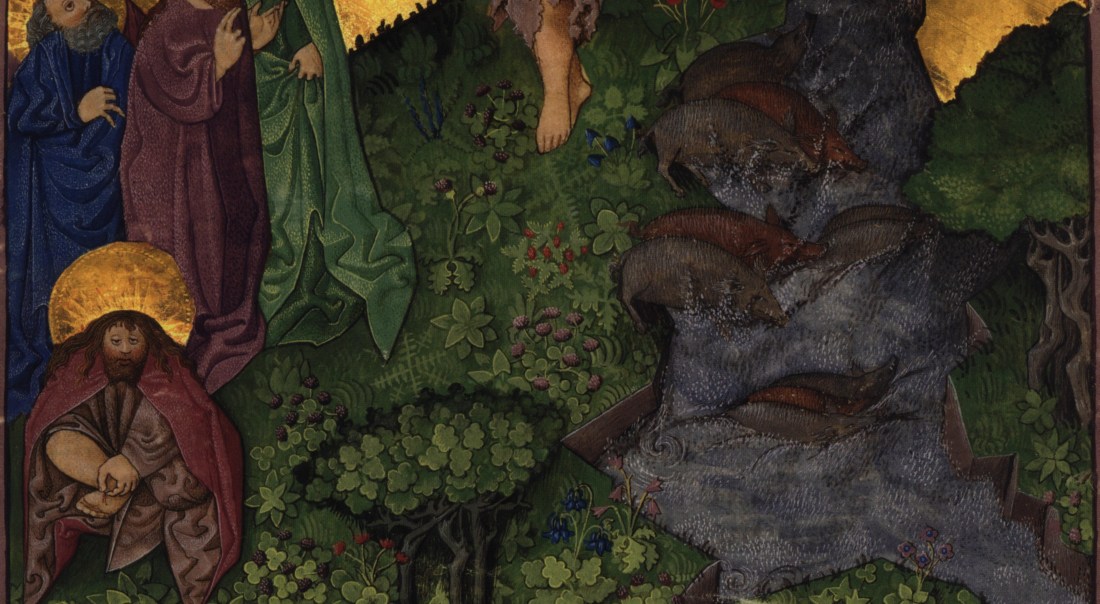Towards the beginning of the Song of Deborah, the Israelite bard makes the following declaration: yivhar elohim chadashim (Judges 5:8a). Due to the grammatical ambiguity of the verb's subject, interpreters are divided on the meaning of the sentence. Literally, the text reads "He chose new gods" or "God chose new ones." If elohim is taken … Continue reading I say You are gods: Remnants of an Israelite heroic age in Judges 5
Tales from the crypt: The historicity of Pilate’s ransacked tomb
The Matthean evangelist makes a number of dramatic additions to the Markan passion narrative. Included among these are the dream of Pilate's wife, the earthquake at the death of Jesus, the resurrection of the saints in Jerusalem, the suicide of Judas, and the risen Christ's rendezvous with his disciples on a mountain in Galilee. Within … Continue reading Tales from the crypt: The historicity of Pilate’s ransacked tomb
No king but Christ: Why Caesar killed Jesus
The four Gospels take pains to blame Jewish priests and Jewish crowds for the crucifixion of Christ. It was these who ultimately condemned Jesus to his fate; their justice, not Rome's, put the Messiah to death. Pilate had tried to release him. Yet historical data from these same Gospels, παραλειπόμενα rarely acknowledged or pieced together, … Continue reading No king but Christ: Why Caesar killed Jesus
Judah’s kinsman redeemer: Israelite solidarity in the Parable of the Good Samaritan
Early Christian readers of the Parable of the Good Samaritan favored allegorical interpretations. The Parable's mysterious central figure, the Samaritan, was a type of Christ the heavenly Savior. Whereas Judaism and the Law of Moses, represented by the priest and the Levite, had failed to save sinners from their condition, God's divine son, the founder … Continue reading Judah’s kinsman redeemer: Israelite solidarity in the Parable of the Good Samaritan
The Elijah option: Contributions of Jehuite propaganda to early Christianity
"Go, inquire of Baal-zebub" A prophet clad in hair and leather appears in Israel to usher in divine judgment and, perhaps, divine salvation. He announces the end of Beelzebub's reign and the restoration of the kingdom of God. For this work he is persecuted by Israel's rulers, and while hidden in the wilderness for forty … Continue reading The Elijah option: Contributions of Jehuite propaganda to early Christianity
Let them both grow together: Resignation as apocalyptic strategy at Qumran and Capernaum
From first to last, and not merely in epilogue, Christianity is eschatology, is hope, forward looking and forward moving, and therefore also revolutionizing and transforming in the present. The eschatological is not one element of Christianity, but it is the medium of the Christian faith as such, the key in which everything in it is … Continue reading Let them both grow together: Resignation as apocalyptic strategy at Qumran and Capernaum
Shipwrecked in the deepest darkness: The Lukan rescue of Paul’s imperiled legacy
The objective of the previous two posts was to determine the historical forces that compelled an anonymous Christian (i.e. Mark) to construct the first narrative account of Jesus as the Son of God. Two factors proved central to this reconstruction of Mark's rhetorical aims: 1) Israel's failed rebellion against Rome spanning AD 66-74, and 2) … Continue reading Shipwrecked in the deepest darkness: The Lukan rescue of Paul’s imperiled legacy
The Gospel of Flavius Vespasianus: Mark’s counter-imperial purposes
Last time I argued that the Markan account of the Gerasene Demoniac betrays knowledge of the Jewish uprising in the region of the Decapolis during the early years of Israel's war with Rome. The resemblance between Legion's ruin in the sea with Josephus' reporting of the Roman massacre of rebels on the banks of the … Continue reading The Gospel of Flavius Vespasianus: Mark’s counter-imperial purposes
Christ’s triumph at Gadara: Markan reflection on Israel’s rebellion
Josephus' account of the war in the north In AD 67 the Roman general Vespasian arrived on the shores of Ptolemais with his son Titus. They had been sent by the emperor to quell a Jewish rebellion in and around Judea. Upon landing, Vespasian and his legions proceeded inland to regain control of Galilee and … Continue reading Christ’s triumph at Gadara: Markan reflection on Israel’s rebellion
The crisis and catharsis of Christian ethics: Non-retaliation as eschatological key to the narrow gate
Theologian Walter Wink popularized the idea that Jesus taught his followers to non-violently resist oppressive authorities by taking socially-unexpected action in the face of injustice. This was typically accomplished by creatively exposing an evildoer to costly public shame. Wink is known particularly for his exposition upon three Dominical commands from the Sermon on the Mount … Continue reading The crisis and catharsis of Christian ethics: Non-retaliation as eschatological key to the narrow gate









